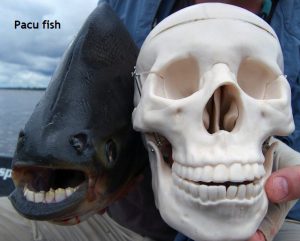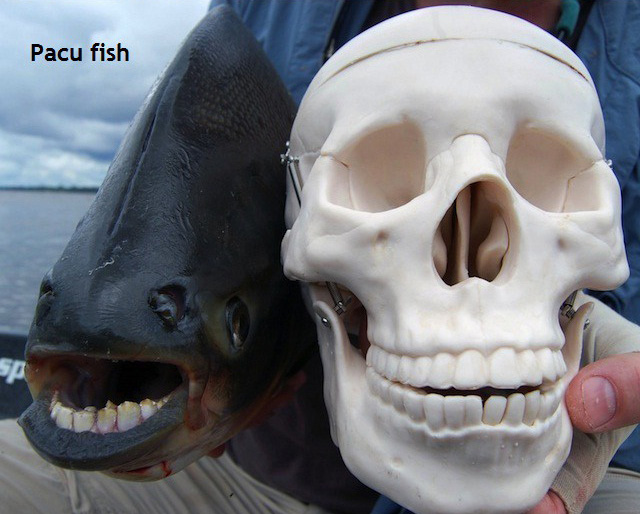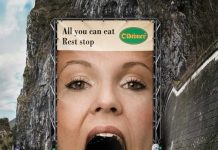Pacu refers to several species of freshwater fish native to South America, part of the subfamily Serrasalminae, which also includes the piranha and the silver dollar. Pacu, a term that originated from the Brazilian Indian language Tupi-guarani, means “quick eater.” Pacu fish from the genus Colossoma is popular in the North American aquarium trade, and is also known as “vegetarian piranha.”
Pacu fish grow quickly in comparison to other fish. They can can reach three feet in length when they reach adulthood, but keep growing throughout their lives. Pacu are sold as pet fish in North America, but mainly used as a food fish in South America, because of their large size and fast growth. Pacu fish require fish tanks larger than 500 gallons, an important thing to consider before buying a pet pacu fish.
The main diet of pacu fish includes plants, algae, nuts and fruits, but also smaller fish, when the food supply is short. Pacu fish are very similar to piranhas when juveniles, but have less protrusive lower jaws. They have a single row of teeth, which are very similar to human teeth, used for grinding, chewing and cracking hard nuts that fall into the river.
Pacu refers to nine genera of fish, including Colossoma, Piaractus and Ossubtus. Fish often sold in pet stores are Colossoma macropomum or black pacu and Colossoma brachypomum, or the red-bellied pacu. Also known as “tambaqui” in South America, the black pacu is the largest species in the subfamily Serrasalminae. The endangered Ossubtus xinguense is endemic to the Xingu River, in Brazil, while Piaractus mesopotamicus is endemic to the Paraguay-Parana River basin.
Pacu fish of the genus Colossoma were introduced into the wild in some areas of the United States, including California, Hawaii, Florida, Texas and Massachusetts. The introduced fish were probably aquarium releases or unwanted overgrown pets. In Georgia and Florida, Colossoma is already considered an invasive species, which refers to introduced species that rapidly spread and can pose a threat to native wild life.
























